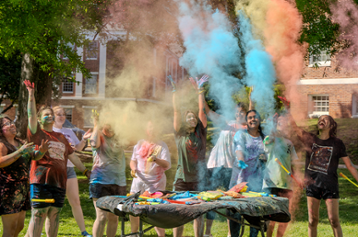Advisor: Dr. Holly Boettger-Tong
hboettger-tong@wesleyancollege.edu
Veterinarians play a vital role in the health care of pets, livestock, zoo animals, and laboratory animals. They also protect humans against diseases carried by animals and conduct research into animal health problems. Veterinarians take health histories of animals, perform and interpret tests, diagnose problems, prescribe medications, develop treatment plans, and perform surgeries. They specialize their care in a number of areas including large, small, and exotic animal care. Veterinarians help pet owners through difficult times, keep our food supply safe, and study diseases that often impact human populations.
Veterinary programs are extremely competitive as there are relatively few programs in the country. Competitive applicants are well-rounded students with excellent academic credentials (see “Coursework” below) competitive GRE scores, outstanding leadership skills, research, and volunteer and shadowing experience. Significant animal experience is generally expected, including time supervised by a veterinarian in both small and large animal settings and time spent in other contact with animals. After completing a bachelor’s degree (which is preferred at most schools), students who have been accepted into a veterinary school program then complete 4 years of veterinary school. Upon completion of veterinary school, passing a professional licensing exam is required. This may be followed by a residency if a specialization is the goal.
The general requirements for veterinary school include the following courses. Some veterinary schools may have different requirements for coursework, so make sure to check with the veterinary school of your choice. You do not have to major in biology or chemistry, but you must have the requisite biology/chemistry courses in order to fulfill the requirements for admission. Contact the pre-Veterinary Advisor, Dr. Holly Boettger-Tong, to discuss timeline, internship and other questions.
Note: There are approximately 27 schools of veterinary medicine in the United States, the closest being the University of Georgia, Auburn University, Tuskegee University, and the University of Florida. Significant preference is given to residents, so it is a best bet to apply in your home state, if you have a vet school there. An excellent GPA (national average is 3.6), the requisite classwork and a variety of internship experiences with different veterinarians will maximize your chances of acceptance.
Course and Semester Hours
*Science Courses Suggested: genetics, microbiology, development, histology, physiology, vertebrate zoology, cell & molecular biology
Other Courses Suggested: marketing, management, psychology
| YEAR ONE Fall Semester | YEAR ONE Spring Semester |
|---|---|
| BIO 110 | BIO 112 |
| CHM 101 | CHM 102 |
| Gen Ed Electives/Foreign Language | Gen Ed Electives/Foreign Language |
| WISE 101 | MAT 220 |
| YEAR TWO Fall Semester | YEAR TWO Spring Semester |
| CHM 221 | CHM 222 |
| BIO 203 | BIO 245 |
| Gen Ed Electives /ENG 111 | Gen Ed Electives/PSY 101 |
| Major Coursework | Major Coursework/PDE |
| YEAR THREE Fall Semester | YEAR THREE Spring Semester |
| PHY 115 | PHY 116 |
| BIO 311 or BIO 320 | BIO 318 |
| BIO 340 | BIO 270 |
| Major Coursework/PDE | Major Coursework/ Gen Ed Electives |
| YEAR FOUR Fall Semester | YEAR FOUR Spring Semester |
| Major Coursework | Major Coursework |
| Gen Ed Electives/PDE | Gen Ed Electives |
| BUS 106 | BIO 341 |
* This plan presumes a minimum SAT score of 600 MAT/CR, entering as a first year traditional student
Please note that as mentioned above, vet schools differ in their criteria and in the weight given to each of the following. Make sure that you are familiar with the criteria used by the vet school to which you are applying. The following is a general consensus of what most schools are using to evaluate applicants, listed in the order of importance.
The resources below are helpful for students preparing for a career in veterinary medicine. Wesleyan's Center for Career Development can help students with deciding if this path fits them, as well as with strategic career planning, creating resumes/CVs, writing personal statements, and more.
It’s important to gain experience with a variety of types of animals and in many different settings, and to keep track of all your experience so you can include it on your resume when you apply to vet school. Many veterinary schools require a specific number of hours of experience both caring for animals, as well as working under the direct supervision of a veterinarian. Check individual school websites for details. You may want to create an Excel spreadsheet where you keep track of all the requirements for each school you plan to apply to. Relevant animal care experiences include 4-H involvement, work on farms, volunteering at humane societies, jobs at zoos, kennel work, etc. The Center for Career Development can help you prepare a resume and practice your professional introduction as you get ready to contact organizations about shadowing, volunteer, or internship opportunities.

Wesleyan College is privileged to steward many arts and cultural events and share them with the community. Most are free and open to the public. Wesleyan art galleries are open M-F 1-5PM and on Wesleyan Market Saturdays from 10AM-2PM.
Event listing
Wesleyan College is home to five NCAA Division III sports: soccer, basketball, volleyball, tennis, and softball. In addition, we offer an award-winning Intercollegiate Horse Show Association (IHSA) Equestrian program.
View More
Tour our beautiful 200-acre campus featuring Georgian architecture, lush green spaces, recreational facilities, residence halls, and worship center.
Vist Wesleyan Virtually